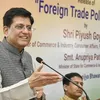WTO meeting: India to oppose continuation of moratorium on customs duties on ecomm trade
India is not in favour of further continuation of the moratorium on customs duties on ecommerce trade at the WTO's meeting in Abu Dhabi later this month as it is impacting the developing countries, an official said on Tuesday.
India is not in favour of further continuation of the moratorium on customs duties on ecommerce trade at the WTO's meeting in Abu Dhabi later this month as it is impacting the developing countries, an official said on Tuesday.
The official said that there is a work programme on e-commerce trade and the members of the World Trade Organisation (WTO) should continue to discuss the issue under that.
"We are not in favour of extension. We are in favour of continuation of the work programme. There is a need to look at the subject from a development dimension and not from the eyes of big tech companies," the official said.
There is a need to discuss the scope of the moratorium as there are revenue implications because of it.
As per estimates, the potential tariff revenue losses to the developing countries are about $10 billion every year. For India, it could be over $500 million every year.
"There is a need for a clear definition of ecommerce trade. We need policy space for the sector," the official added.
The subject would figure prominently in the meeting of 164 trade ministers who would gather in Abu Dhabi from February 26-29.
The World Trade Organisation (WTO) members have agreed not to impose customs duties on electronic transmissions since 1998 and the moratorium has been periodically extended at successive ministerial conferences (MC), which is the highest decision-making body of the 164-member body.
India and South Africa on several occasions have asked the organisation to revisit the issue and have highlighted the adverse impact of the moratorium on developing countries.
India is witnessing a rise in imports of electronic transmissions, mainly of items like movies, music, video games and printed matter, some of which could fall within the scope of the moratorium.
While the profits and revenues of digital players are rising steadily, the ability of the governments to check these imports and generate additional tariff revenues is being limited because of the moratorium.
Developed countries the US, Australia, and Japan want an extension of the moratorium.
The official also said that the move of the 70 developed member nations of the WTO to take extra commitments under the General Agreement on Trade in Services (GATS) and extend benefits of those obligations to all 164 nations may benefit India's services sector also.
"Our services sector may get an advantage in those 70 countries because you (Indian professionals or services sector firms) will get a more certain regime, more predictable regime, in terms of the regulatory requirements," the official said.
The official added that Indian professionals like chartered accountants or medical practitioners may have to follow simple regulatory regimes in those nations.
At the margins of the 11th WTO Ministerial Conference in 2017, the joint initiative on Services Domestic Regulation was established with the objective of developing disciplines to mitigate the unintended trade restrictive effects of measures relating to licensing requirements and procedures, qualification requirements and procedures, and technical standards.
Citing an example, the official said, "Suppose you are submitting a license to work as a telecom operator, so the obligation such as licensing condition should be very transparently told, if there is a change in the licensing condition, that should be told in advance...so these kind of regulatory requirements...so all that you will get".
The group of 70 nations would provide it on MFN (most favoured nation) basis and the existing obligations under the agreement would not be diminished.
"The group is basically modifying their schedules of specific commitments which are there in services and they are taking additional commitments. Those will be offered to all the WTO members on an MFN basis," the official said.








